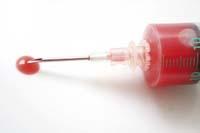Screening for rejections using blood tests

Increasing the amount of donor DNA in blood may be an indicator of rejection
Transplanted patients may be detected whether or not they have rejected organs in the blood. This has been proposed by researchers at Stanford University in PNAS magazine. According to them, there is the possibility of avoiding the technique currently used to determine if a rejection has occurred, through which periodic biopsies of the transplanted organ are performed.
When a body rejects the transplanted organs, its cells die slowly and DNA fragments enter the blood of the receptor. Therefore, although donor DNA always appears in the blood, when rejection occurs the amount of DNA increases. This has been seen by Stanford researchers who monitored seven recipients and, through a blood test, knew the status of the transplant. On average, they found that there is no problem when donor DNA is less than 1% of total blood DNA. An increase of 3-4% indicates that the recipient is rejecting the transplant.
Blood tests identified 83% of the situations that were about to occur. It is therefore a technique that still needs to be adjusted and requires more trials and trials, but researchers are convinced that it can have great potential.





